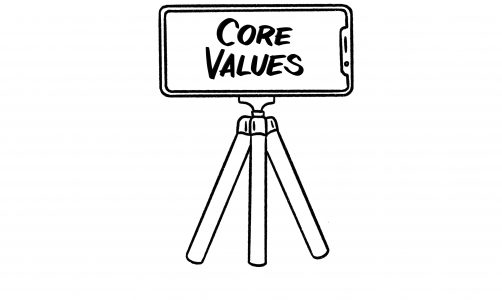Widgetized Section
Go to Admin » Appearance » Widgets » and move Gabfire Widget: Social into that MastheadOverlay zone
Core Values as a Foundation for Thinking About Ethics Education
The views expressed are those of the author and do not necessarily reflect the views of ASPA as an organization.
By JoAnne Speers
March 14, 2022

Scholars and practitioners have repeatedly and persuasively made the case in this publication for public agencies to engage in periodic ethics training. Accrediting organizations also encourage attention to ethics in public service degree programs.
This column is the first of four that will describe an accessible framework for thinking about in-service and other forms of public and nonprofit sector ethics education efforts. The framework is informed by behavioral ethics research, which sheds light on why humans fall short of their intentions to act consistently with their values.
After briefly exploring the challenges ethics educators can face, this column suggests a starting place of universal core values.
Challenges of Ethics Education
Ethics educators—and those who support ethics learning within their organizations—typically face a number of challenges.
With in-service ethics education, learners often come from diverse backgrounds. They may be skeptical about the value and efficacy of being “taught” ethics. Perhaps the most salient challenge is the limited amount of time and resources organizations feel they have to give the topic. This is particularly so if the education must balance covering ethics laws (“must not do’s”) with ethical analysis (“ought to do’s”).
Public administration and public policy programs can face similar constraints. There is so much to impart to position students for public and nonprofit service success. This can mean that programs chose, for better or worse, to integrate coverage of ethics issues across their curricula instead of through a stand-alone course.
An Option to Consider: A Core Values Based Framework
Research by Rushworth Kidder’s Institute for Global Ethics indicates that humans share certain universal or core values. These values transcend differences in nationality, religion and culture. Dr. Kidder’s book, Moral Courage, explains that these universal values include trustworthiness (including honesty), responsibility, respect, fairness and compassion.
These values are a useful starting point in deciding what the “right thing to do” is. Mary Gentile adopts these values in her Giving Voice to Values framework (see here for a video summary). She also notes that “values conflicts” are a regular and predictable part of professional life—hence the importance of helping learners navigate such conflicts.
Framing “ethics issues” as “values issues” has several advantages. Some of them are the following.
- Universality. The concept of core values seems to resonate with learners in both the in-service and academic contexts. Learners find it to be a reasonable, and hence acceptable, foundational premise. A core values approach is also more accessible to faculty with a wide range of subject matter expertise, who may not feel comfortable integrating more philosophical and complex frameworks for thinking about ethics into their courses.
- Discussion Language. The core values framework provides a language for analyzing and discussing situations presenting ethical issues. This can be especially helpful in situations involving competing core values (another Kidder concept). It also can be a tool for discouraging conclusory statements relating to a course of action being “wrong,” “immoral,” “unethical” or “corrupt.” This leads to more productive, analytic and civil exchanges.
- Relationship to Codes of Ethics. A core values approach naturally segues into discussions about professional and personal codes of ethics. Various public agency professionals have adopted codes that flesh out what kinds of behaviors reflect these core values. Of course, the public administration profession at large is fortunate to have the ASPA code of ethics, whose provisions can be mapped to these core values.
- Tie-In to Ethics Laws. Some learners may perceive their jurisdictions’ ethics laws and processes as overly broad, burdensome and intrusive. (“Why does procurement have to be so cumbersome?”) Asking learners to relate such laws to universally-shared values like fairness and trustworthiness can be pedagogically helpful in encouraging compliance.
- Accreditation Standards and Definitions. A leading public service accreditation program requires accredited programs to emphasize what it calls “public service values.” These values include two of the above core values (respect and fairness). The remaining concepts in the accreditor’s list map to the five universal core values. For example, the public service values of “competence” and “efficiency” map to the core value of responsibility, as does acting in the public interest.
Finally, the concept of core values ties into a helpful working definition of integrity. Integrity is a concept often included in organizations’ values statements but not always defined. Craig Dunn, in his article, “Integrity Matters,” tackles this task. After an extensive literature analysis, he also identifies socially-positive values as a key touchstone. Paraphrased, Dunn concludes integrity is acting consistently with positive values, across time and across roles.
Conclusion/Next Topics
As authors in this journal have noted, a clear and strong analytic framework is important to achieving the goals of ethics education. The concept of core values is a potential starting point for such a framework.
A goal of ethics education is to provide learners with analytical tools to help them “do the right thing” in their public service roles. The next column (June) will explore 1) what science says about human decision-making relating to ethics, and 2) the implications of this science for ethics educational efforts.
Author: JoAnne Speers trains and consults on public service ethics as principal of S2 Ethics Strategies. She previously served as chief executive of the Institute for Local Government, where she developed and directed its ethics program. JoAnne also is an adjunct professor in the University of Pacific’s McGeorge public policy and public administration programs. She can be reached at jspeers@strategies4ethics.


Cody Scott
March 14, 2022 at 3:05 pm
Exactly what I did my thesis on! Very well done here